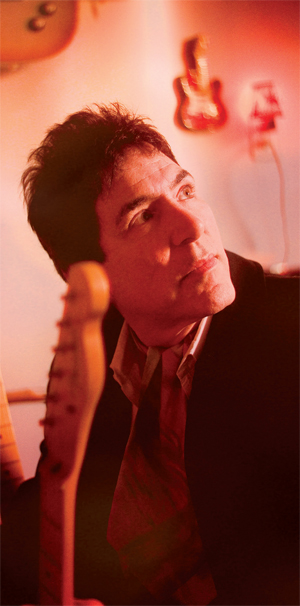Jim Campilongo: Tele Like It Is

Originally published in Guitar World, April 2010
Guitar World sits down with Jim Campilongo where he talks about his new studio album, Orange.
Jim Campilongo's created a monster album. That’s no surprise, since he’s the reigning mad scientist of the Telecaster, a reputation he earned during his Trio’s seven-year Monday night residency at New York City’s Living Room, his tenure in the Little Willies with singer Norah Jones, and his support of a roster of other daring vocalists, including Martha Wainwright and Brandi Shearer.
But the earth-scorching, rock-breaking riffs that thunder through tunes like “Backburner” and “I’m Helen Keller and You’re a Waffle Iron” on his eighth album, Orange, are a radical departure from the often-low-key textural sorcery that’s been his signature. And for a guy who’s known for eschewing effects, Campilongo goes whole hog on his cover of the Stooges’ “No Fun,” employing a Klon Centaur, Fulltone OCD, Demeter Compulator compressor, Boomerang looper, Boss RC-20 Loop Station and a Line 6 DL4 delay .
“I was surprised myself,” Campilongo says. “But I was listening to a lot of heavy rock: the Who, Minor Threat, the MC5, Link Wray, Iggy Pop. I’d gone through an arc of playing blues, country and jazz, and supporting vocalists. I was missing how great a barre chord could sound.”
Campilongo recorded most of the album with his 15-year musical partner, a worn ’59 Telecaster that’s being reproduced as a signature model by the Fender Custom Shop. “It sounds nice and bassy,” he says, “and my whole right-hand thing”—his pick-and-three-fingers approach—“instantly came together.”
He confesses to opening his Fender Princeton and Vibrolux amps wide for much of the sessions, but Campilongo’s gentler roots in the music of Tele masters Jimmy Bryant and Roy Buchanan and saxophonist Lee Konitz come through in numbers like “Awful Pretty, Pretty Awful,” where he swaps his Tele for a Gretsch Country Gentleman. He also takes a slow, graceful trip across the changes of composer Billy Strayhorn’s “Chelsea Bridge,” replete with volume swells and behind-the-nut string bending.
Get The Pick Newsletter
All the latest guitar news, interviews, lessons, reviews, deals and more, direct to your inbox!
“For the players I admire, their sound is everything,” Campilongo says. “So while I’m always working to improve, having a sound and a vibe are my priorities.”


![[from left] George Harrison with his Gretsch Country Gentleman, Norman Harris of Norman's Rare Guitars holds a gold-top Les Paul, John Fogerty with his legendary 1969 Rickenbacker](https://cdn.mos.cms.futurecdn.net/TuH3nuhn9etqjdn5sy4ntW.jpg)







